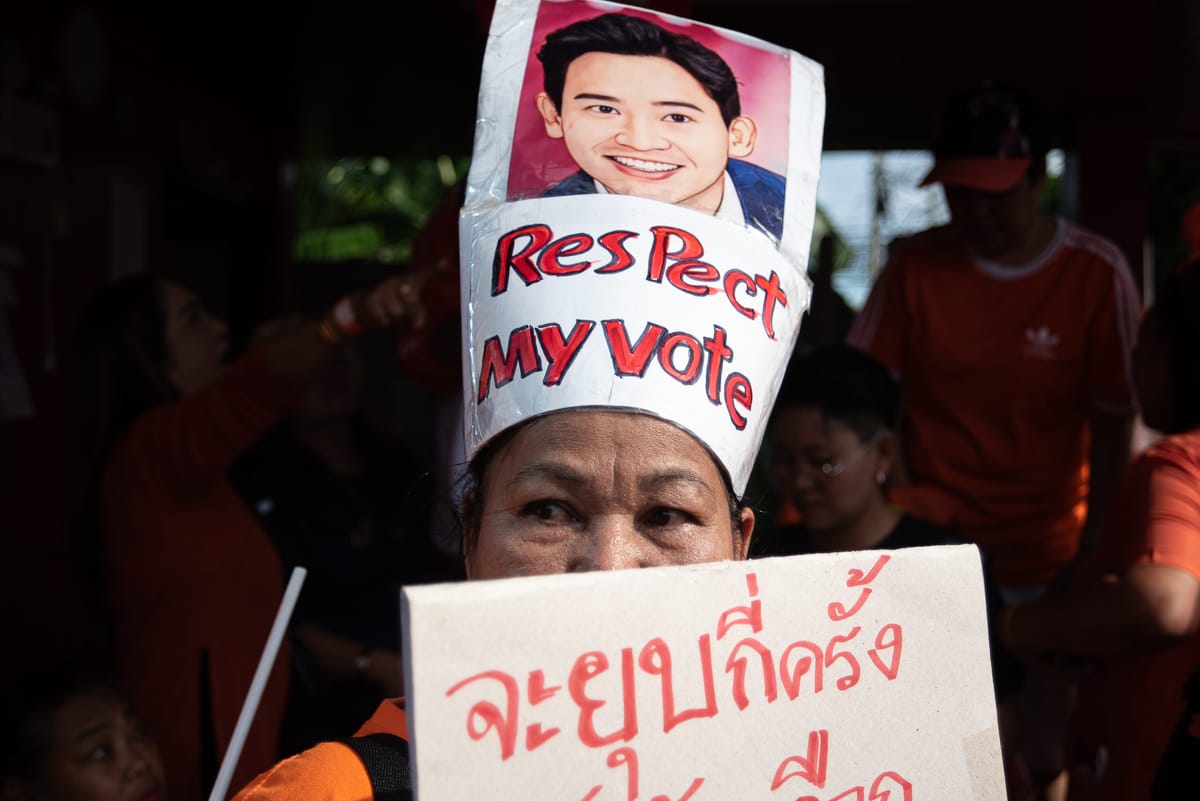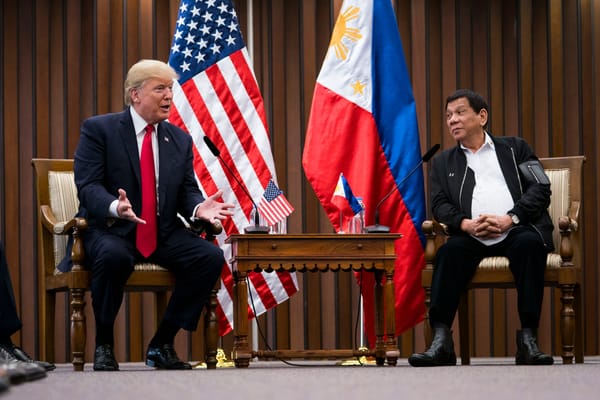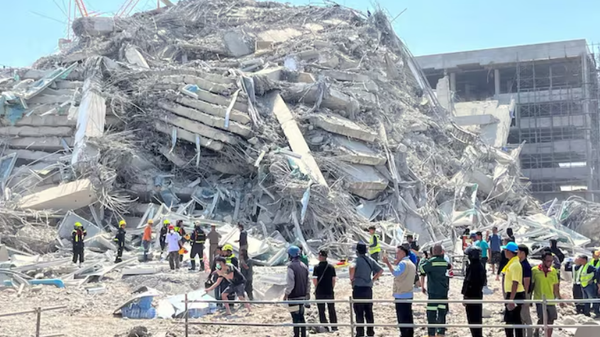Prospect of Democratisation in the World of Disruptive Change

- Democratic Alliance crumble with words
It has been the third month of 2025, and the world has been turned upside down with the return to Trump's presidency. The transatlantic alliance has stood for 75 years since the foundation of NATO in 1949, now it crumbled in a moment's time. It came crashing with the verbal spats between president Zelenskyy and the duo Trump-Vance. But why does it matter? Transatlantic Alliance is the heart of global democracy, if you had seen democratic backsliding elsewhere in the world, Transatlantic democracy would have still stood strong and stedfast, because it is home to the oldest democracies and guaranteed by the number one's military power in the World.
But once it was on the verge of faltering, it faltered with pure words, so frail and perishing like next to nothing. Clearly, for all the consequences it had, it placed the World's Democracy under the state of emergency. Ukraine is not just the frontline of Europe, but also where the future of global democracy will be decided. Imagine if Ukraine lost with the Russian troops parading through, anti-democratic forces would rise in European nations, emboldened by war losers' sentiment; angst and fury; and democracy-turned-illiberal America now actively campaigned for regime change and destablising institutions in Europe. And the consequences are profoundly unprecedented. Europe is poised to spend on 900-billion-dollar plan for rearmament which would raise each member's spending on defense to 3% or more, with larger consensus and common understanding this time; nonetheless, it is still a race against time, as the battlefields in Ukraine can't wait.
This time around, democracy and democratic institutions will be put on the dock and face judgement whether it has strength to accommodate change nationally and region-wide fast enough to save itself from imminent threats. It is stupidly naive to be predicated on the end of history theory, and temptation to count on the superiority of democracy over "alternative systems" for self-correction and guarding off unexpected threats. Democracy has its own fragility like any human system, its institutions need to be shored up, and have necessary pro-change mechanisms prepared in the face of change. And yet, our politicians took every chance to sabotage the democratic institutions and left them struggling with internal issues, like the fools inflicting pains on themselves. A lesson learnt drawn from the past mistakes when German Chancellor Merkel sacrificed German energy security for cheap energy from Russia. And when Russia annexed Crimea following the Revolution of Dignity in 2014; they did not make a good reading of the threats that Russia was representing. Germany, like an addict inked another agreement with Russia to construct Nord Stream II which supplied more Russian gas into the German economy. And it begs a question why would the generation of politicians who focus on de-risking, risk mitigation, and standard performance of the financial industry fail to anticipate the risk of crowing Russian invaders to be the guardian of German energy (and German economy to a larger extent)? Time and again, it seems as democratic politicians put their countries, economic and political institutions at their own way's risk and fail to respond to the crisis rather than democracy would naturally fail to perform. Every system has its "human factor", and time and again, politicians commit self-inflicting acts, and leaving us look like the foolish. Now we are facing the make-or-break-moment of democracy, and regardless of our own past self-harm actions, we have the institutions for fighting the crisis, our politicians, yet, need more determination and making good on democratic values and spirits.
The world stood witness to the fall of Berlin World which brough democracy to Eastern Europe, and lesser known event call Baltic Way in which 690-kilometre human chain of 2 million people (one-fourth of the total population in three Baltic States) was formed to show their solidarity, hope and passion for democracy. It demonstrated once we have a certain enjoyment of peace and order, democracy will advance and democracy will win the heart of majority and will win big times. I always argue with my colleagues that if Ukrainian frontline can hold back to Russian aggressions, democracy will advance in Georgia, Slovakia, and Serbia; where illiberal forces are still ruling, even Viktor Orban's Hungary will not last. And we must not forget through the decades, the European Union has been expansive with more member states, who joined to share the prosperity, not miseries. This trend will continue if the Ukrainians could stave off Russian incursions into the democratic territories.
- The roots of American democratic crisis
Unavoidably we have to wrap our heads around the question whether American democracy is beyond repair or whether it could be fixed. I would not hazard a guess on the future of America where I'm not authorised to, but trying to making a causational analysis of American democratic crisis and leaving this questions to the ones who fight for democracy and progressive values in America. During the post-Covid era, American democracy continued to pick up with a rate from 2.3-3%, while the rest of developed countries had a standstill or even growth veering the minus territory. And it is winning key battles in technologies from renewable innovations, or AI. And yet, it fails to stave off another term of Donald Trump; as the resentment and grievances remain as deep as when it began, and economic growth has not been perceived on the dining table of the voters, growth came to somewhere else, just not into voters' pockets and confidence. American politicians always fail to grasp that the oligarchs and their money do not vote in our political economy, the ordinary voters do. And yet; votes and voices mean little to nothing when it comes to policies, the American billionaires channel their billions to influence the elections and bend the policies in their favours. The economy was de-regulated for greater corporate gains, and the financial crisis in 2010 broke out in the aftermaths. In 2010 financial crisis, the federal government came in rescue to the corporates who were the perpetrators as their top priorities; while leaving the people to their own device. After the Covid-19, the economy picked up, but the growth does not trick down to the bottom 50%, it comes in forms of windfall profits enjoyed by the top 1% or top 10%, and the rest continue to struggle. And to make a stark contrast with the windfall gains of the billionaires, the bereavements for life loss and precariousness stricken by the Covid-19 pandemic are ignored by the Biden's Administration complacency on economic booms experienced during his terms, his touting for economic achievement did not aid his vice president campaign, if only making her look more despicable and a continuation of voters' betrayal. In fairness to Biden, he should not be responsible for all the long-standing grievances and ailments of American democracy, and he did put in place sensible socio-economic policies and aid package, but he did nothing to ease it out and failed to take on the giant corporations during his terms.
American politicians fail to understand democracy also needs patriotism, and economy also need some sort of economic patriotism; but patriotisms derives its essences from the preservation of dignity and equality, recognitions, and security. It is disastrous to have politicians who argued for the cuts of free health care and affordable education whereas America wealth totally has the capacity to provide these, and each time they dismiss these as socialist ideas, they are running risk of eating up people's dignity in that "even how patriotic and hard the work I do for the economy, I am labelled as socialist if I ask for the entitlements of basic welfare and securities to make my life less precarious".
The management of a national economy is not just concerned with how to perform the financial flows, or moving the interest rates up and down, controlling inflation and deficits; it is also concerned with the distribution of wealth in society (with which dignity and recognitions are attached with), and ensuring the inclusive with the backbone of the middle class and creating dynamics and chances for the bottom 50%; and social securities for all. All the economic indicators must be viewed through the lens of how it will make an impact on the voters. And putting aside the complex tasks of micro-economics, the economy should be the security provider of our democracy by making it workable for the people who vote and contribute to the economy. It is also self-inflicting an act of American ruling establishment to make the economy become the weakest point of democracy.
But on top of that, American democracy is also struggling to transform within corruptions of the ageing presidential system. During the presidential campaign, most of the candidates ran on the populistic promise that if I'm elected, then everything. But the president does not have a mandate to deliver on everything. The president is elected by roughly a half of the population and have the other half vote against him. He comes to pack up his office with unelected technocratic officials, those who never have to run for representative to get a job, whether genuine technocrats, but simply unelected. Most of the democratic mandates actually comes from the law makers in the House who unfortunately struggled with the precarity of 2-year term, and have their political career susceptible to the money provided by the billionaires to keep their campaign alive. The political parties are left free hands to gerrymander the political electoral districts, and democratic behaviours are committed so blatantly, or without any attempts to cover up even. And democracy as a system also needs stability, the filtration of big money into politics and polarisation unfortunately de-stabilises American democracy with the next president being tempted to overthrow the policies introduced by his predecessor. And actually Trump did not deviate from the patterns and traits of American presidential democracy, he just proved to be the worst form of it with the proclivities to rule by decrees, abusing the executive power at the expense of stripping the legislation of power, making the court less fair and impartial, and censoring free media. If reasonable presidents are likely to share the power and learn to listen, and seek the legitimacy through seeking consensus the Congress and Senate for his policies; such an unwritten norm to keep this fragile presidential democracy in checks and balance, Trump cares nothing about keeping this norm which he "was not having a deal with".
- The death of Americanism and implications on democracy progress in developing nations
America has influenced the world's democracy movements and I oftentimes refer this influence as Americanism. The death of Americanism does not imply that the global democracy will retreat, and I don't see it that way. It is a lesson learnt that the developing nations have to be alert on social solidarity and securities. Politicians from the developing nations are tempted to argue that they have to compromise the environmental regulations, workers' salaries, equality, or investments in health care and education for a fast-growing economy. And the failure of the American model turned them to the fact that the development must be sustainable and inclusive through strengthening safeguards of people's living conditions and the environment; the catch-up will not validate the compromises on safeguarding conditions.
If our ecosystem is a diverse web of elements playing their own role in such a ways as if one element is taken out, the whole system will collapse, our social fabrics are also the same; if one group of people are left behind, the whole will fall because we are interconnected and interdependent, and we vote in the same system.
The democracy movements in developing nations, in my opinion, will move from the "open-up stimulus" trap to counting more on the inner strength derived from building the movements, values, building necessary organisation for change.
But what is open-up stimulus in the question? Here in Vietnam, our democratisation has been intertwined with the concept of "opening-up". The economic opportunities will be offered if the political regime commits to continued opening-up of the economy and society. If not being an ally of the West, it is expected that the regime will maintain the balance of diplomacy between America and China, not bowing more towards the Sino-sphere.
This theory is valid in such a narrow and specific context, but largely misleading; and every time the communist governors face trouble with their decayed communist system, they promise more opening-up and expect some bonuses. It would come in a form of softening their anti-democratic propaganda, geeting limited sectors more privitised, and adopting a semblance of liberal tones to "trick" foreign investments and support from "Western" countries. But the new context might totally debunk the old trick and trap of "opening-up".
It is true that western businesses and investments are leaving China, but it is also leaving for where it is safe and secure. The guarantees for investments are not provided through half-baked commitments of "opening-up", or few words which carry vague liberal connotations. The guarantees are only provided in a condition of having strong democratic institutions, having long-term visions and policies. Vietnam has portrayed their economy as strongly oriented on exports, and FDIs. But in the bullet ways of trade wars and global reshuffling of the supply chains, it starts to loose out the access to the existing customer markets (American market has become less stable and predictable, and other countries need to find alternative, so does Vietnam; and EVFTA with the European Union remains to be on papers because of the regime's failure to implement policies for independent trade unions). FDIs saw a slight slowdown in 2023 with the downsizing of Samsung, and Apple cancelling its plans on investing in Vietnam; and FDIs are more bitterly competitive over time with emerging challengers such as Indonesia, India, Brazil, and quite of late Bangladesh. The regime looked to the economy heavily depended on state enterprises, and weak domestic market which they would not be able to rely on. More financial stimulus pumped to economy, and government spending might help to engineer some growth on reports. But this growth is not appreciated by the wider public and comes with consequences and de-stabilising effects for each penny squandered for the years to come.
To add up to their embattling situation, the world is not frozen in time, and the problems and signs of extreme crisis start to show as Vietnam tries to navigate in the new global context. The region's cleavage start to show between those who are democratic and those who resist democratic values and institutions. Backtracking from democracy progress or progressive goals and targets is not an answer. Similarly, Trump's America has of late pulled out of a three-billion-dollar commitments to help Vietnam and Indonesia build up renewables, but a return to coal-fired plants in the absence of America initiatives is purely absurd. In the next 10 years, any countries that fail on green transformation do not secure economic stabilities, because the world has got on board of green transformation, regardless of endless debate on the intermittent nature of renewables, or rare earth and renewable waste issues; nothing would stop the green transformation and Paris agreement commitments to keep the global temporary rise below 2 Celsius degree or preferably 1.5. And it is not delivered by words but energy investment and planning policies, and national climate action plans. Democracy, and human rights have been institutionalised as key to navigate the new era, taken any pieces of investment documents or FTAs, democratic values and freedoms are part of the activating clauses.
We might just guess what the key takeaways were from the meeting between Mr. To Lam; and Lao and Cambodian leaders in February. Both Laos and Cambodia are crashing after the massive divestment and liquidation of the Belt and Road Initiatives. Beijing once brought in BRI investments to both countries, creating a pretense for those leaders that the BRI would be a solutions to fend off the global wave of democracy, China's generous investments are able to offset the need to adopt democracy, which is a better form of governance. Laos might have been waken up to the debt traps from the Railway connected to China, and the environmental catastrophic hydropower projects selling power to no one, and spawning mining sites which pauperise the locals in the proximity. Cambodia's 1.7 million Funan Techno is put on halt due to China backing out from financing commitment, so is the 1.5-billion Techo Takhmao International Airport. American retreat from global leadership has brought to attention, but the China's retreatment and divestment from BRI is also occurring in quietness, leaving the countries of its influence in ruins and tatters. I believe that the trio's conversation would be heavy on the crises they are all met with and they might acknowledge that it had implications on the political futures of their regimes. China's liquidation and divestment is a critical note, because it means the end of free-floating financial flows that tolerate corruptions, strings attached, and irresponsibility.
Myanmar is also an epitome of democratic backlashes and suppression of peaceful pro-democracy protests leading to wars and national collapse. In the meantime, Indonesia, Malaysia, or the Philippines; regardless of their institutional issues and room for improvement proves to be comfortably secure and promising in their future thanks to commitments to democracy and building democratic institutions.
The "open-up stimulus" is placed on the wider context of globalisation in the past decades. The globalisation visualises a world with increasing connectivity and integration, yet, failing to take into account the weak national institutions and vulnerabilities the nation-states are still faced with. Weak institutions could not be glued together for better integration and connectivity.
The endless flow of goods and services and movements of wealth leave the politicians sitting on complacency that wealth brought by globalisation would alter demands on continual improvements of the democratic institutions, or more democratisation, and efforts on maintaining solidarity and social securities, more investments in necessary infrastructure for the shared future. The flow of wealth enriched the rich, and the powerful among social statra, and entrenched the poor with a ceiling from growth and moving up the social ladder; while making the overall living quality degrade; labour remaining to be cheap, environmental degradation outpacing GDP growth. The reshuffling of globalisation does not imply the end of globalisation, but it highlights the need to strengthen national democracies before we final have a better-organised globalising movement.
The absence of America from the international stage could mean no global hegemon to institute political interventions or pursue regime change to uproot authoritarian forces, but in many cases the downfall of an authoritarian force is the good mulch for another one which could be equally reserved and bellicose (such as the transition from the Soviet State to Putin's Russia, or the Middle East failed national projects due to regime change as in Afghanistan, or Syria). Democracy remains to be the only way to go, and it will continue to prevail with any alternatives to democratisation are extreme crises, escalating violence, or even national collapse. But it is also more demanding in the level of requirements to have democratic politicians who are visionary and determined for maintaining strong democratic organisation, and institutions in the face of disruptions and uncertainties. Despite political impasse recently observed in western democracies, and general decline in Global Democracy Index, big moments are waiting down the lines, but the chances are only for those who are prepared.





